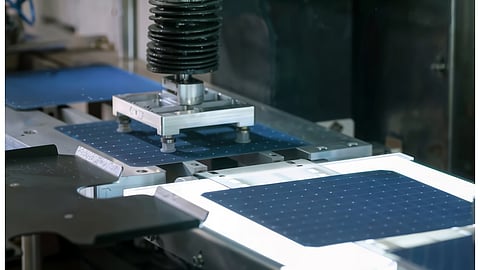

DGTR has recommended imposing up to 30% anti-dumping duty on Chinese solar cells/modules for a period of 3 years
The domestic manufacturing industry claims that imports surged during the injury period, harming their sales and market share
Domestic producers increased output but faced losses and were forced to sell below cost due to cheaper imports
DGTR found dumped imports undercut prices, threatening further injury to the Indian solar industry
The Directorate General of Trade Remedies (DGTR) in India has recommended imposing an anti-dumping duty (ADD) of up to 30% on solar cells, whether or not assembled into modules, originating in or exported from China, for a period of 3 years. It will come into effect post-publication in the Gazette of India.
The decision comes within a year of the investigation initiated at the request of petitioners, namely FS India Solar Ventures Private Ltd., Jupiter International Ltd., Tata Power Solar System Ltd., and TP Solar Ltd. RenewSys India Private Ltd. was also a co-petitioner, but it pulled out during the course of the investigation.
The period of investigation (POI) was April 1, 2023, to March 31, 2024. It covered the periods of FY 2020-21, FY 2021-22, FY 2022-23, and the POI to examine injury analysis. During the entire POI, India imported more than 30.7 GW of subject solar cells. The domestic industry claims that the volume of subject imports increased by 271% during the injury period, while the volume of solar cell imports rose by an additional 63% in the subsequent period.
In 2021-2022, the volume of imports was more than double that of the previous year. It declined in 2022-23 owing to the imposition of 25% Basic Customs Duty (BCD) on solar cells from April 1, 2022, which was lowered to 20% in the Union Budget 2025 and came into force from February 2, 2025 (see Union Budget 2025: India Reduces Tariffs on Imported Solar Cells and Modules).
The domestic industry submitted to DGTR that the increase in imports in POI is due to a steep price reduction by the Chinese producers. It claims that domestic manufacturers were forced to curtail their production. While domestic industry output increased by 456% over the injury period, domestic sales increased by only 112%. As a result, FS India claims it was forced to sell 41% lower than its cost.
Manufacturers also claim to have lost various contracts to cheaper Chinese imports. The industry was unable to fully utilize its capacities while piling up inventories and being unable to sell its goods in the market.
“Due to the presence of such significant volume of subject imports, the domestic industry was unable to sell its goods in the market and its market share in total demand was abysmally low,” determined DGTR, while subject imports were “undercutting the price.”
“The dumped imports are also threatening to cause further injury to the domestic industry,” observed DGTR. “The domestic industry was also unable to reach its projected or targeted levels, and its performance was much lower than that projected at the time of commencement of production.”
It has determined that Chinese companies have been dumping solar cells into the Indian market at dumping margins of up to 115%, and has recommended injury margin levels on imports from various Chinese companies in the list that’s available on DGTR’s website.
In May 2025, the Indian Ministry of Finance, acting on the recommendation of the DGTR, imposed an ADD on solar glass originating in or exported from China and Vietnam for 3 years (see India Imposes Anti-Dumping Duty On Imported Solar Glass).
Recently, DGTR also launched an AD probe into solar encapsulant imports from South Korea, Thailand, and Vietnam following a petition from RenewSys (see India Initiates AD Investigation Into Imported Solar Encapsulants).
In a related development, India is also planning to introduce a dedicated import monitoring system to keep a close watch on solar energy equipment entering the country. The system will track product details, country of origin, and compliance with harmonized system codes, according to The Economic Times report.
